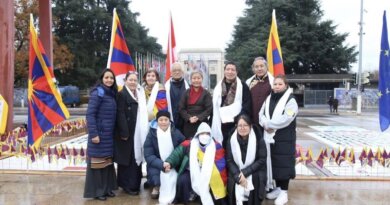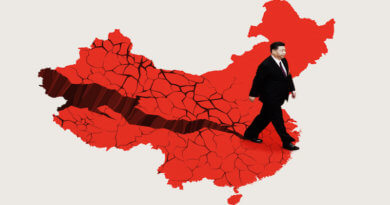Tsering Wangmo: It takes a lot of thinking and being vulnerable to make personal films like ‘boundaries’

Tsering Wangmo is a documentary filmmaker and an anthropology student at Washington University in St. Louis.
Wangmo, born and raised in India won top honours at the eighth juried competition of the Cinema at Citygarden program for her latest experimental short film ‘Boundaries’ last week. She has so far written, produced or directed six documentary films.
Her previous films were screened across several international film festivals. She won several awards including three awards at the ‘My Hero International Film Festival (MHIFF).’ She is is an alumna of NYU’s documentary film production program.
In this interview, the filmmaker talks about her latest experimental short film ‘Boundaries’, filmmaking as a tool for creative Storytelling, what inspires her and the struggles and challenging aspects of filmmaking. (Acronyms TE and TW will be used in the following interview to address Tibet Express and Tsering Wangmo respectively.)
Tibet Express(TE): Your latest film ‘Boundaries’, won top honours at the eighth juried competition of the Cinema at Citygarden program. Can you tell us something about your documentary film, what it’s about and the inspiration behind it?
Tsering Wangmo (TW): This is not a documentary but an experimental short film, running for approximately 4 minutes. It marks my first endeavour at creating an experimental work. The central theme revolves around the profound relationship between humanity and nature and a desire to be free from the politics of boundaries. Despite the dominating influence of geopolitical circumstances on our lives, our connection to nature remains an unyielding source that defies limitations and empowers us with a self-determined agency.
The inspiration for this film stems from the experiences of refugees and exiles, particularly Tibetans born in Tibet, who are in the diaspora, far from their families and the lands where they took their first steps. Where they have so many memories and established their earliest connections to nature. My partner, Tenzin Jigme and his friends who are from Tibet has inspired me greatly for this project. I plan to expand upon the concepts explored in this film and develop a more extensive version in the future.
TE: This is your sixth documentary film and your previous films were screened at several international film festivals and you won several awards as well. What are your thoughts on receiving another award? How is the experience of winning Cinema at Citygarden program?
TW: Cinema at Citygarden is an annual short film competition organised by Cinema St Louis. They screen the winning films on their video wall for one month at the sculpture park in St Louis which is a beautiful place full of some amazing art works. It takes a lot of thinking and being vulnerable to make personal films like “boundaries” and I think recognition just means that people understand what I am trying to express and feel the work is relevant.
TE: Is filmmaking something you dreamed of while in school or is it something you got into later?
TW: Forget about dreaming about filmmaking, growing up in Ladakh, our resources were the bare minimum. As a teenager in TCV school Ladakh, we were taught about what floppy meant and how to use it when the world has already started moving on with pen drives and the internet but we did have sporadic TV time. I don’t remember how often but it happened once in a while that the class would be shown a movie on a small TV. Everyone loved watching films. My father particularly loved Bollywood films. We also watched a lot of films at home that came on DD1 and DD2. In terms of my first passion for media in general, it has to be the radio and TV news. That’s why I went on to study journalism after school.
TE: Do you remember the first proper film that you watched? One that has left an impression on you.
TW: I don’t remember the first films but one film that left a deep impression on me was Abbas Kiarostami’s The Bread and Alley (1970) and Two Solutions for One Problem (1975). We saw it at one of the movie times at school when I was in high school. This was the first time that I became very aware of children who were also living a familiar life in a different part of the world.
TE: What is the most challenging aspect of documentary filmmaking?
TW: The most challenging aspect of filmmaking is the lack of funds and money to bring projects to life.
TE: From ‘Tibetan Nomads in Exile’ to ‘Boundaries’ your films centre around exile, refugee, statelessness, belongingness, memory, identity and traumas from war and displacement. What aspect of filmmaking interests or intrigues you? How do you try to approach a film artistically as a director?

TW: Filmmaking as a tool for creative storytelling is what interests me the most. The way this medium can be manipulated to connect with the audience, to make the audience think about issues, and to provoke certain responses from them calls for skilful use of the language of cinema and that’s something I try to learn more about by making films and more so by watching other films. My first approach is to think about cohesively building the story and then spend more time thinking about how the audience will experience the story. I work on a storyboard and I have written scripts but things change in documentary stories but scripts are still useful in capturing one’s vision. It becomes a casual guide and a point of reference albeit one that can be changed.
TE: Though our exile Tibetan filmmaking sphere is nascent and growing, there are a number of films made. What is your favourite Tibetan Film made in exile? And why?
TW: I have the greatest respect for Ritu Sarin and Tenzin Sonam. They have made so many films and I love them all. I think their film “The Sun Behind the Clouds” (2010) is one of the most important films ever made on the issue of the Tibetan independence movement. I love Tenzin Dasel’s works. Her first film Seed (2009) captures very beautifully the sadness and dilemma of Tibetan youths living in exile. Ngawang Choephel’s first documentary Tibet in Song (2009) is a must-watch for all. The film takes us into Tibet and creates a much-needed connection between Tibetan inside and in exile through its focus on traditional songs and the events leading to and aftermath of Ngawang Choephel’s incarceration on false charges by the Chinese police. It is a film profound in both its story and its storytelling. You asked me only about exile filmmakers but I want to express that I am deeply inspired by the exceptional works of Pema Tseden. A true pioneer. He will forever be such a force for the film community.
TE: You are an alumna of NYU’s documentary film production program and doing your PhD studies in anthropology at Washington University now. You have made films before studying filmmaking and after studying filmmaking as well. Can you explain through your experience, the difference between making a film before and after studying filmmaking?
TW: I made my first film “Tibetan Nomads in Exile” (2018) as a thesis film for the program at NYU. The program at NYU is intensive and it trains you to be an all-rounder independent filmmaker. I learned all aspects of documentary filmmaking during this time. What I can tell for sure is that going to film school gave me confidence and vital skills to be competent and creative although these can be achieved without going to film school. The professors were highly respected filmmakers so learning from them was a great opportunity. Meeting with creative minds, speaking about my thought process, answering difficult questions about choices made, and getting everyday feedback on my projects was the most important learning experience.
TE: What is your interest genre in filmmaking and why?
TW: I am interested in documentary films and drama because the stories I want to focus on fit within these two genres and their sub-genres. I love watching psychological thrillers because of the element of mystery in their tension and conflict.
TE: What traits or talents does a person must have to become a good filmmaker in your opinion?
TW: I don’t think I even have the kind of experience needed to answer such a question but I think passion and a knowledge of how things work is vital. There are many roles to be taken in the process of filmmaking. If one is interested in camerawork they can focus more on cinematography, and if someone is interested in editing they can focus on developing their editing skills, etc. In short, developing the necessary skills is the first step next to your passion.
TE: Filmmaking is often a long process. You write, direct and produce your films. What is the most enjoyable part of it? Do you get commissioned to make your documentaries or are you responsible for finding the funding for all your films?
TW: I love cinematography the most because it is both physical and involves a lot of instant creative choices. I fund my films by saving money from other works done through commissions. One of my films, “Looking Back In Exile” (2019) was made possible through the generosity of so many people who supported my crowdfunding campaign. I was able to do substantial research, gather a lot of data, and make a short film from the funds.
TE: You also run a website called Tibetan Material Culture – Documenting material cultures of Tibetan Drokpas – Tell us a bit about that project.
TW: Tibetan Material Culture cannot be wrapped in one website but this was a way for me to provide open-access information to anyone interested in Tibetan culture and material production. I am extremely grateful to the Tibetan Drokpa community in Ladakh who have generously shared with me their knowledge on some of the vital materials that are very much a part of both the past and the present. My main aim was to make their knowledge and wisdom available to future generations of Tibetans and to anyone interested in understanding more about Tibetan material cultures and Drokpa traditions. This website was started with support from the Tibetan Art and Culture Fund.
TE: Are you working on any films right now? Are any projects in the pipeline?
TW: I have been working on two screenplays since 2020. A short and feature-length script based on a story that is at once personal and universal. I don’t know when these will come to life as much of it depends on the availability of funds.
TE Any final words of advice for someone new and just getting started in documentary filmmaking?
TW: Passion and determination matter a lot. Connect with people and always be active. Engage with local film festivals, in Dharamshala, events like Tibet Film Festival and DIFF are great opportunities to watch and learn. Work on other people’s projects and find commissioned work while you also focus on developing your projects. Develop your skills so that you can work and get paid doing what you love doing. Be persistent. If you think I can be of any help to you in your personal projects. Feel free to reach me. Wish you the best.






